Thomas Kemper: “Love the Neo-Nazis?”
Many of us were stunned by the hatred that spewed forth from Charlottesville as white supremacists demonstrated that racism remains far more virulent in our society than many of us realized. And the neo-Nazi chants of “Jews will not replace us” made it abundantly clear that this orgy of hatred was not limited exclusively to racial bigotry.
In a recent blog posted to this website, Thomas Kemper, General Secretary of Global Ministries of the United Methodist Church, described a dramatic demonstration of interfaith collaboration as he and people of many different faiths endured a bombing that killed 40 people in the Istanbul airport last year. More recently, he has shared the emotions he experienced as the swastika was unfurled in Charlottesville. His statements are particularly insightful because he is German. When Thomas compares the Charlottesville incident with Germany’s past, he knows that of which he speaks. His statements authenticate the gravity of the situation upon us.
Love the Neo-Nazis?
Thomas Kemper, General Secretary of Global Ministries of the United Methodist Churchs
As an international agency, the United Methodist General Board of Global Ministries, which I lead, seldom makes statements about events in the United States. Yet as a Christian and as a German I feel compelled to publicly register my shock at the mid-August scenes from Charlottesville where blatant and unashamed Nazi images were prominent and shouts of “blood and soil,” the Nazi “Blut und Boden,” heard—all symbols of evil Nazi ideology. And, young Americans stretched out their arms in the “Heil Hitler” salute and waved swastikas—in the United States of America, in Virginia, in 2017.
The heavily armed militia of the “Unite the Right” rally is a jarring reminder for me of Hitler’s SA marching through the Brandenburg gate in the 1930s at the end of the Weimar Republic and igniting the Nazi reign of terror and death. I am not saying the scenes from Charlottesville are comparable to those days but I could not help but to associate Charlottesville with moments during the Weimer era in Germany. The images from those days and the reports from Charlottesville are so strikingly similar.
It is inexplicable to me how such hate and violence can be expressed in such a public way in the United States today. It is also distressing to Christian friends in Germany who honor with affection the American example of democracy and openness. Retired German United Methodist Bishop Walter Klaiber in a recent letter to friends and colleagues in the United States wrote of the deep sorrow in his heart as he saw the swastika unfurled in Charlottesville. These emotions are so strong because we Germans remain grateful to the American people for liberating our country from Hitler and his fascist regime.
We Germans have a sad history. We know we killed over 6 million Jews and other minorities such as Roma, Sinti, and homosexuals. We are still struggling with this past, reminding our children of it, trying to help them gain familiarity with and perspective on the Holocaust and its horrors. We pray this history may not be repeated and “Wehret den Anfängen,” translated “Resist the beginning” is a call to constant vigilance wherever Nazism and Fascism is rearing its ugly head. For Christians everywhere must stand up to neo-Nazis.
What remains unresolved for me is the question of how the church, including The United Methodist church, must and can react. We cannot tolerate racism, white supremacy, and Nazi hatred. That much is clear, but what about ministry to neo-Nazis—those who are full of fear and anxiety and have lost their way in the world? How do we welcome them, offering God’s transforming grace? Is that possible? I have no idea how that would work or what such an effort might look like. What would the UMC look like if it reached out to neo-Nazis? Is it possible to love neo-Nazis and white supremacists into peace, justice, and mercy?

